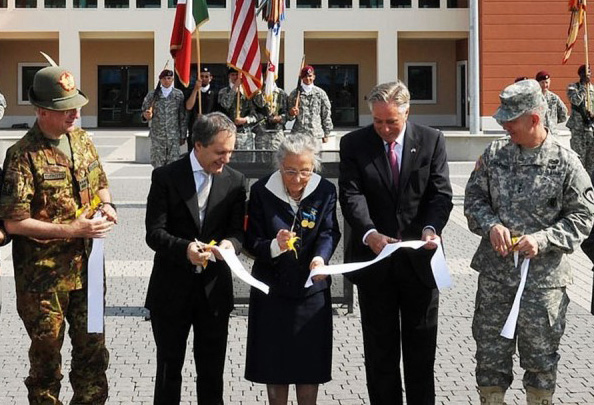A small virtual gathering of Italian eyewitnesses took place at the U.S. Army in Italy’s public affairs office to recall the Liberation of Italy and the 75th anniversary of V-E Day.
Digital technology provided the stage for the four Italian men and women to recount their vivid memories of April 28, 1945 – the date when American troops arrived to liberate Vicenza and the surrounding region from the Nazi regime.
Sergio Scaroni of Sandrigo, a town a few miles north of Vicenza, was a 15-year-old boy, when in the early hours he watched soldiers from the 350th Infantry Regiment arrive. He remembered the people cheering with joy after a column of tanks with American soldiers entered the town. He also remembered that on that date, he tasted chocolate, which had been something he had gone without for years. “I was living and still do in the same house, which dates back to 1640. Next to the house there was the stable, but it was empty at the end of the war because everything had been plundered. Americans moved a big truck there and used it as a field kitchen. Some 50 soldiers slept in the big attic, while nine officers found room in three bedrooms located on the first floor,” Scaroni explained.
Throughout the years, his relationship with Americans became stronger. His daughter married an Army officer from Caserma Ederle in 1992.
Mr. Scaroni has been to the United States several times with his wife, Caterina. In 2005, he visited the American Cemetery in Florence with his son-in-law. Since then, he regularly visits each Memorial Day to pay tribute to the soldiers who “came from a free and democratic nation to fight for our freedom and democracy.”
Another significant memory was shared by Francesco Zattra, who recently turned 96. He was born in Monte di Malo, but he has been living in the town of Isola Vicentina for many decades.
“I don’t remember a lot of my first ten years,” he said during the interview, but remembers how he was forced to enlist at the age of 19, in April 1943 and served with the Alpini. He fought on the front lines in Tolmino, which is now in Slovenia, against the Russians. He was there when the Armistice proclamation of September 8, 1943 was announced by Gen. Pietro Badoglio. The Armistice of Cassibile stipulated the surrender of Italy to the Allies which triggered the German invasion of Italy. “I remember a stampede of people by foot or with mules when we were trying to escape from the Germans,” he explained.
After a daring series of events, he evaded capture and managed to board a train that brought him within walking distance of his hometown. He made it back and served as a guard in the town hall of Isola Vicentina. That is where he was on the night of April 28, 1945.
“After years of dictatorship by Mussolini, liberation was a huge change. I remember seeing a big U.S. tank for the first time, so I asked if I could take a look at it,” Zattra said.
He spoke of his other memories, such as people coming out of their homes with flasks of wine to celebrate the end of one of the darkest periods in human history. After recalling other atrocities that happened near his hometown, Zattra wants the younger generations to remember the lessons of the war. “Young people should think about it. If possible, it is really important to remember what happened. Americans are and will always be welcome to me because they have built something very positive.”
Meri Mion is another local resident who remembers the day of the liberation. It happened on her 13th birthday. She was born in San Pietro in Gù, about ten miles northeast of Vicenza. She and her 48-year-old mother spent the night hiding in the attic of their farmhouse along the main road of town. Her father had gone to get food for the livestock and was not due back until the following day. “One of my brothers had been imprisoned by the Germans, while the older one had to run away and we didn’t know where he was. There was a lot of fear; we didn’t know what was going on. We had only seen the column of Americans go by,” said Mion.
She remembered that night as the Germans retreated, they fired many shots at her house. The memories still haunt her. “During the war, we had moved to a room under a porch and brought the radio with us. In the evening the neighbors used to come to listen to the news at our house. My mom also brought a bottle of grappa to keep us warm,” she continued.
She described how in the morning she woke up to discover an American command post was only 150 yards from their house. “We were happy that the Americans had liberated our town; my mom and I prepared a cake because it was my birthday. Since then, every year on my birthday I always think about everything that happened that night, but I’m happy because it had such a happy ending,” she said.
With fewer veterans and witnesses able to share personal memories, the surviving Italians who are grateful to those who fought for their freedom are more determined than ever to keep alive the memory of Liberation Day and its significance for the future. One of them, who actively participated in the Resistance and fought as a partisan, earning a Gold Medal for Valor, is Paola Del Din. The Friuli and Venezia Giulia regions were still at war, occupied by Nazis, Russians and Yugoslavian troops near the Tagliamento River.
“At that time, I had to take special care of my two companions from the Bigelow Mission who had been captured and injured,” she explained.
The radio operator had a head injury, but no longer had the transmitter to communicate with the base in Tuscany. Even in such a difficult situation, Del Din managed to retrieve a spare transmitter and get it to the radio operator so it could go back on the air.
“On April 28, I was asked to bring two messages to two transmitting stations. I went and delivered them; the insurrection broke out in the area and I had to wait until May 1 to be able to return to Udine,” she said.
Just when she was entering the city, she saw the allied column arriving. While at the castle of Udine, two young men from the Osoppo, the partisan brigade, hoisted the Tricolor flag. The city had been liberated and her heart nearly burst with joy and pride.
These four local survivors of WWII want to inspire younger generations with a message of hope to persevere under impossible conditions.





